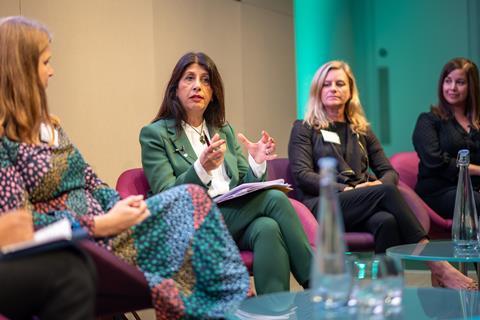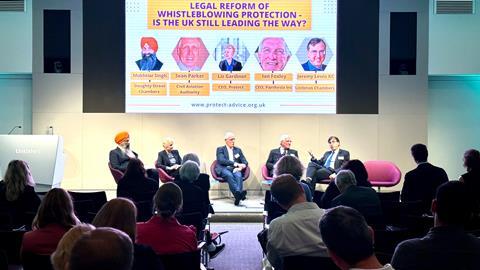Whistleblowing charity Protect debated legal reform, SLAPPs, climate change, and women and the #MeToo movement at its anniversary conference last Thursday.
The organisation, formerly Public Concern at Work, also launched its environmental whistleblowing toolkit, a comprehensive 80-page guide aimed at helping support those who want to raise concerns about damage to the environment.
Employment lawyer at CM Murray LLP Beth Hale sat on a panel titled ‘women, whistleblowing and why #MeToo has changed the way we work’.
She said: ‘The world has changed beyond all recognition but it has not changed enough. [There has been] a change in process for lawyers, for employers, in terms of their approach to sexual harassment. We routinely see senior men, not always…but largely, being exited when complaints have been made by junior lawyers.
‘Has it changed in law and process in terms of NDAs [non-disclosure agreements]? Yes it has. Employment lawyers are thinking about whether NDAs are appropriate. We would see NDAs of one line saying you shall not say anything. Now, they are taking up a page. That has changed beyond all recognition. Is there still work to do? Of course, there is.’
Law Society president Lubna Shuja, who also sat on the panel, added: ‘If you have got a party on the other side that is not represented, solicitors are ultimately responsible [to make sure] that party understand what they are signing. The regulator has got a very important role to set the boundaries and the guidelines on how we go forward. These are disciplinary offences and the regulator will take action against [solicitors] for that.’
Hale added: ‘Having the threat of regulator action is as serious, if not more so, as the threat of legal action [for lawyers].’
In answer to a question on one thing the panel would like to see to make the usage of NDAs better, Shuja said: ‘Equality of arms.
‘The SRA have made it very clear that if a lawyer is dealing with a non-represented person on the other side, the duty [is] on the lawyer to make sure [the unrepresented side] know what [they are] getting into. It is a disciplinary offence to take unfair advantage.
‘One thing we have been doing in the Law Society is a real focus on the fix, because this is a culture change.’

During another panel discussion on legal reform, Jeremy Lewis KC of Littleton Chambers, said: ‘One should not lose sight of the benefit legislation achieves, a lot [of cases] are settled because settlement is achieved.’ He told the audience that costs following the event in employment tribunals ‘would make it easier to get a lawyer’ to represent individuals and help avoid an inequality of arms.
Gavin Millar KC of Matrix Chambers, speaking on SLAPPs, gave the background to the origins of the term, coined by two Americans in 1988. He said: ‘SLAPPs are much talked about, not always understood. SLAPPs need to be rebranded so we can talk about them in modern language.’
He told the audience the question of how meritless litigation had to be considered a SLAPP was ‘highly contentious’. The threat of legal action is ‘often what stops the freedom of expression’ with SLAPPs also used against protesters.
He said: ‘It is brought against you by someone that can afford it and has the time and money to pursue it.
‘We need justice to be able to use that sort of balance exercise [the balance of social good and social evil in the case] to throw cases out.’
Meirion Jones, former editor of the Bureau of Investigative Journalism, added: ‘The simple thing is change the law. When a law is so unbalanced that it protects multiple offenders, huge predators and does the same for huge companies that do not exist in any real sense…we actually need to change the law.’
This article is now closed for comment.




























6 Readers' comments